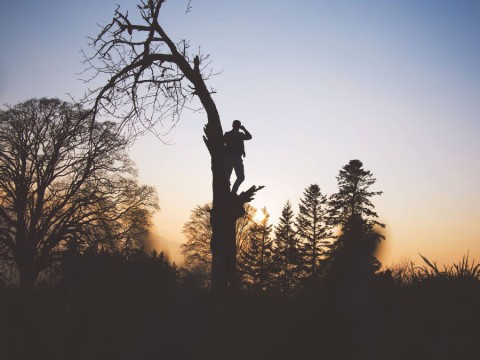Not long ago a tree came to my office. A mighty oak. The breadth of the branches was tremendous. No way this tree could fit through my door.
What did I do? I stepped outside to the parking lot. I’ve made accommodations for clients before. Clients with special needs.
This tree definitely had needs. I’m no arborist, but I could see that much. At one end of the trunk was a massive root ball, brown and gnarly, seemingly chaotic; at the other end, an equally massive canopy of branches. The tree rolled along like a giant barbell, leaving dirt, bits of bark, and tattered leaves in its wake, as I walked us to the most secluded corner of the lot.
The tree (I’ll call him Morris, not his real name) wanted to start from the beginning. I’m no Freudian, but I do believe in the primacy of childhood experience, so I let him tell me about his acorn days. He seemed both proud and defensive to have sprouted from such humble origins. As he rambled on in this vein, I realized he was shilly-shallying.
“Forgive me,” I said, “but you need to get to the root of the problem.”
We both groaned, and I counted that shared response as a small breakthrough.
“You’ll laugh at me when I tell you,” Morris said.
“No, I’ll just listen,” I said.
“That’s precisely why I’m here,” Morris said.
The parking lot was quiet. We were in that middle of the afternoon lull between the late-lunch bunch pulling in and the leave-work-early crowd pulling out. A jet zoomed overhead and left a wispy white trail in the pale blue sky.
“Long-story short: I fell over in a forest. No one heard. Since then I keep asking myself, Did I even make a sound?”
“What do you think?” I said.
“I don’t know. What do you think?”
The feeling behind his story was not unknown to me. In my early thirties, I published a modest collection of poems purchased by no more than two hundred people, read, I imagine, by far fewer. From time to time, when I lecture on depressive disorders, I can’t help but notice audience members who check their phones, gaze out windows, or adopt the glazed expression of someone merely pretending to listen.
Even in the realm of love I’ve known the vast silence of the unheard fall.
“Of course you made a sound!” I said to Morris.
Early in my career, I tried to be a perfect mirror. The client would look to me for truth and see only herself, without distortion. I strived to be neutral, objective, neither augmenting nor diminishing. Now I view my role differently. Clients may think they want truth, but what they really want is hope.
Morris’s branches fluttered. “You grow and grow. You spread your roots. But when you fall, you wonder what it all meant.”
Nearing the end of my own career, I too wonder, but I saw no benefit in telling Morris.
“I bet you left a hell of a mark,” I said.
“Thanks,” Morris said.
Neither of us spoke for a good long while. The jet’s white wake had completely vanished.
“If I had to guess,” I said, “the point isn’t to last, just to be.”
“Even though, eventually…?” Morris asked.
“That’s my belief,” I said. I tried to speak with just the right mix of confidence and uncertainty.
Morris’s branches fluttered again.
“Did you do that, or was it the wind?”
“Good question,” he said.
Sometimes in my line of work, you feel inexplicably close to a client. This was one such moment.
“I have to ask,” I said. “Any particular reason you came to me?”
“Oh, I knew your desk,” Morris said, and with that, he slowly rolled away, leaving behind an intricate pattern of dirt, bark, and leaves.



 The SmokeLong Grand Micro Contest (The Mikey) is now an annual competition celebrating and compensating the best micro fiction and nonfiction online.
The SmokeLong Grand Micro Contest (The Mikey) is now an annual competition celebrating and compensating the best micro fiction and nonfiction online.